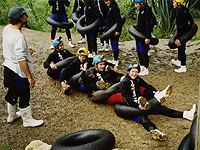Tanya's | Travels
|
Tanya's | Travels |
|
|
Europe | Asia | Africa
Go, Granny, Go!Copyright © Tanya Piejus, 2002 The adventure sport known as blackwater rafting involves spending two hours in a borrowed wetsuit riding down underground rivers on an inflated inner tube from a tractor. It is pitch black and the only light you have is from a tiny, feeble bulb attached to your heavy helmet and the faint blue glimmer of a myriad glow-worms on the cave ceilings. The water is bone-numbingly cold and you jump off waterfalls, get whirled uncontrollably through rushing eddies and squeeze your way under ledges with only six inches of air between the rock above and the water below, all the time pushing your inner tube ahead of you or riding the river sprawled inside it. I was 26 when I rafted the Waitomo Caves in New Zealand. My great aunt Norma was 72. Norma is by no means atypical of New Zealand's senior citizens. Your average British pensioner does nothing more physically demanding than Zimmer frame their way to the shops for a couple of tins of beans and a pint of milk and, if they are really up for it, attend the odd low-impact exercise class. Kiwi over-65s are independently mobile, walk miles across their farms to round up cows twice a day, hunt possums in the bush at night, sail sea-going yachts and do all manner of energetic things that British wrinklies would have given up long ago as something that they did when they were young, if indeed they ever did them at all. New Zealand's pensioners are not old in the way that we Brits think of as old. They act young, they look young, they dress young. Norma bustles around in jeans and trainers, not kilts from M&S and extra-wide slip-ons from Clarks. She does not fall asleep in the middle of the afternoon or have milky drinks before bedtime. She has travelled all over her own country and has been out of it several times. Many British pensioners have never left the town where they were born. New Zealand's OAPs relish life, Britain's often just seem to be waiting to die. I have often heard it said that New Zealand is stuck in some sort of time-warp, resembling Britain in the 1950s. It seems to me that this is the kind of thing that someone who has never been there would say. Britain 25 years ago was recovering from a war that had crippled it economically and socially, was fussing over new conflicts in Korea and Egypt, mourning a king and crowning a queen, dealing with thalidomide and race riots. It was an inward-looking, fretful place and the New Zealand of the 1990s could not be more different. The Kiwis have not made war against anyone since 1945, it is thriving economically through increased trade with Asia, is happy with its politics and commonwealth status. Rather than carrying the weight of the past on their backs, the pakehas are making peace with the Maori by righting the wrongs committed by their British ancestors. New Zealand is, it seems to me, an outward-looking, relaxed and happy place. My grandparents left it in 1955 to come back to England because New Zealand was a cultural desert in those days, but they would love it now with its theatres, museums, art galleries and cinemas. Modern New Zealand, I think, represents what Britain would be like if the sun shone more often, there were a lot less of us and we had never ruled an empire. Kiwis have none of the uptight habits that we British are so hidebound by. They do not tip, ever. You get what you pay for and there is none of this stress-inducing ritual of having to calculate and add on 15% of the bill that Britons go through every time they pay for a meal. Kiwis are not snobbish because they have no class system. The only people they actively dislike are the Australians but that is because, according to my uncle Vern, the Aussies know they are inferior but still treat New Zealand like their local national park. The Maori are accorded far more respect than indigenous people in any other part of the world and when whites talk about social problems in the Maori communities they do so in a tone of sympathy not disgust. The subtle but ingrained racism that is part of everyday life in Britain does not seem to occur widely in New Zealand. Young New Zealanders still see the world as their oyster and want to get out and see it. New Zealand is a collection of islands like the UK but its inhabitants do not have the same insular mentality that treats all foreigners with suspicion, even though they are much further away from the rest of the world than we are. Young Britons have no aspirations any more, no desire to find out what is beyond their own four walls. New Zealand itself is the youngster, the baby of the empire family. It is full of curiosity about what is going on around it. It has built an interesting and stable life for itself, developed a personality unsullied by a troubled past. It does not have the burden of historical responsibility to large parts of the planet that rests on the shoulders of the grand old dame that gave it the means to set out on its own. It is beautiful, confident in its own abilities and knows its own weaknesses and what is more, it has fun. I don't know about you but, when I'm 72, I want to be swirling down an underground river looking for glow-worms on a big rubber ring just like great aunt Norma. |

Preparing to go blackwater rafting Amazon.co.uk picks:
|